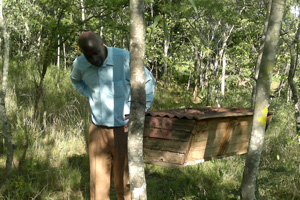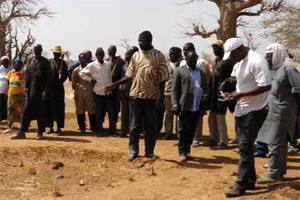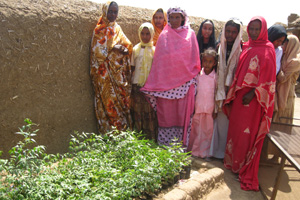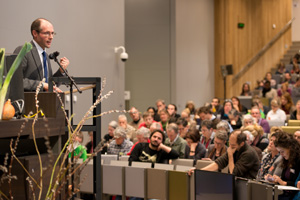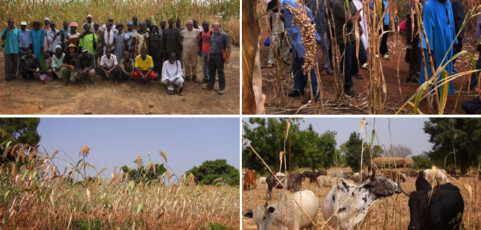A research project on improved fallows examined how short-term rotations of selected perennial tree and shrub species impact cereal yields and soil quality in subsistence maize cropping systems. The effects of improved fallows on maize yields were significant when combining a tree species (Gliricidia) and a nitrogen-fixing legume (Stylosanthes). Read more
Agroforesterie pour la sécurité alimentaire au Malawi
Le Malawi est confronté à une myriade de problèmes environnementaux, sociaux et sanitaires, y compris l’insécurité alimentaire, la dégradation des terres et la déforestation. Un programme d’agroforesterie promeut la plantation d’arbres pour augmenter les rendements des cultures dans les sols épuisés, lutter contre la déforestation et autonomiser les femmes.
Agroforestry for Food Security in Malawi
Malawi faces myriad of environmental, social, and human health challenges, including food insecurity, land degradation and deforestation. An agroforestry program promotes tree planting to increase crop yields in previously depleted soils, reverse deforestation, and empower women.
Read more
Agroecology and Water Harvesting in Zimbabwe
Since the late 1960s, Zephaniah Phiri Maseko has pioneered a unique, innovative vision for community and agricultural development through judicious water management; his system has been widely adopted across the country, increasing agricultural productivity and resilience in this semi-arid region.
Addressing the Challenges of Food Insecurity and Environmental Degradation in Zambia
Community Markets for Conservation (COMACO) has helped people address the challenges of food insecurity and environmental degradation while conserving wildlife and other natural resources. COMACO is one of the few programs that operate at the scale of an entire ecosystem—contributing to increased wildlife numbers, better protected habitats, improved food security, and better incomes.
This case study was produced by the Oakland Institute. It is copublished by the Oakland Institute and the Alliance for Food Sovereignty in Africa AFSA). A full set of case studies can be found at www.oaklandinstitute.org and www.afsafrica.org
Bees bring a new buzz to family farming in Zimbabwe
One way that family farmers improve their resilience to both climatic and economic shocks is to diversify what is produced. More and different crops and livestock, particularly local varieties and breeds are being promoted. Two other options stand out too – bees and trees. These have the added advantages of complementing the production of agricultural crops and enhancing the agroecosystem. In Zimbabwe, the Ruzivo Trust has been promoting beekeeping, and the results are showing the sweet taste of success. Bees can help farmers break out of poverty.
Moving from vulnerability to resilience in Africa
In August 2012, the Seidu family had to cope with the bad harvest. Like many farming families in northern Ghana, they had to adopt the ‘one-zero-one’ strategy for the children and the ‘zero-zero-one’ strategy for themselves. ‘One’ represents a meal, ‘zero’ is no meal. So during the lean season, their four children had breakfast in the morning, nothing at midday, and a meal in the evening.
Home nurseries: Viable businesses with environmental awareness
Butana is a dry plateau in northern Sudan, east of the river Nile. Covering 65,000 square kilometres, less than 10% can be described as ‘woodland’ in the vaguest sense of the word, and even these trees are disappearing rapidly. The Butana Integrated Rural Development Project began in 2008 with the aim of supporting the livelihoods of poor family farmers by strengthening their resilience in the face of recurrent droughts. And improving tree cover was a key means of achieving this.
Agroecology and the right to food – Interview with Olivier De Schutter
Interview > Olivier De Schutter – “Agroecology is really common sense. It means understanding how nature works, to replicate the natural workings of nature on farms in order to reduce dependency on external inputs. Agroecology preserves the ability for future generations to feed themselves. I believe we should teach more about agroecology and encourage exchanges between farmers. We cannot continue in this impasse of an oil dependent food production system.”
From slash and burn to ‘slash and mulch’
In semi-arid cropping regions of West Africa, fallow periods are getting shorter. As land becomes more scarce, farmers are not able to give their soils enough time to rest. This is leading to depletion of soil organic matter, severely threatening soil fertility and damaging soil structure. In the worst cases, crops hardly yield anything anymore. But this is not an option for family farmers. In Burkina Faso, some have found ways to restore their soils that have been dubbed ‘slash and mulch’. The improvement and spread of these techniques also proves the importance of partnerships between farmers and researchers in developing locally suited practices.

